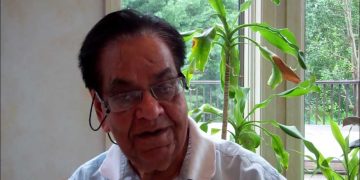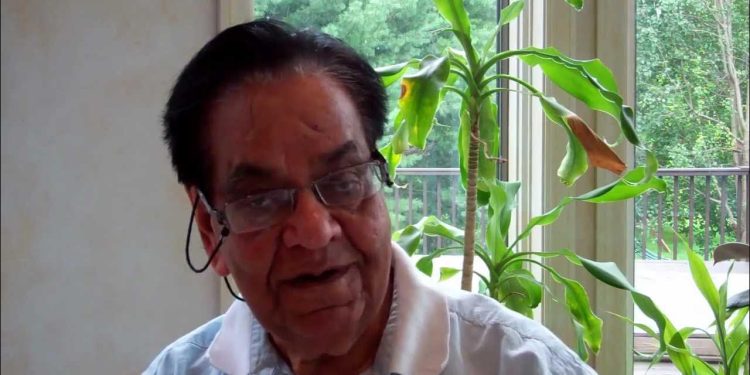Dr. Jagat Motwani passed away on December 27 at a hospital at 97 in New York. He left behind impeccable academic credentials. He was a brilliant thinker, outstanding writer, and an extraordinary man whose work and legacy will live on. He was regarded as a path-breaking scholar who engaged members of the original Indian diaspora – the indentured laborers or girmityas and their descendants. It was through him and a few others that the Indian government began focusing greater attention on the diaspora and courting the descendants of the girmityas.
Jagat will be most remembered for his incredible contributions to scholarship on the Indian diaspora inclusive of Indo-Caribbeans. He collaborated with Dr Mahin Gosine, Dr Dhanpaul Narine, Dr Kumar Mahabir, and myself. He complimented our work and writings on the diaspora that informed academics in India. He touched the lives of so many Indo-Caribbean activists and scholars with his kindness and generosity and for championing the Indian government to take up the issue of social justice for Indians whose rights were being trampled in several countries not the least being Guyana, Suriname, and Fiji. He was also an exceptionally caring human being who inquired about the Indian communities in the Girmitya countries.
An Indian diaspora specialist, Jagat worked closely with Indo-Caribbean people in greater New York. His greatest impact came from taking the time to engage and work closely Indo-Caribbean people and in penning many articles and books on the diaspora. He collaborated and or co-authored several works with Indo-Caribbeans. Tributes came from Ashook Ramsarran who credited Jagat for bringing him into GOPIO and Deo Gosine who knew Jagat through fellow engineer Lal Motwani, his brother. Ashook, who served as President of GOPIO for several years, Deo, and Jagat had close working relationship at GOPIO and in organizing other events. I also had a long mostly academic relationship with Jagat Motwani, a seriously scholar of the Indian diaspora.
I met Jagat through an introduction by late Ramesh Kalicharran who met earlier through Yashpal Soi and other Indian nationals associated with organizing the annual FIA India Independence Day parade in Manhattan. I was co-organizing a week-long academic conference on Indians in the diaspora at Columbia University (July 1988) and months earlier Kali informed me that Jagat and a group of Indian nationals wished to meet me about participating in the conference and their plan to organize the First Convention of People of Indian Origin (slated for August 1989 in NY). I first met Jagat at Kali’s office which used to serve as a meeting and planning place for many events relating to Indians. Jagat and I, as was also the case with Yashpal Soi and I meeting frequently at Kali’s, discussed Indo-Caribbean issues and about our US struggle for restoration of democracy in Guyana and the lack of support from the Indian government for our cause. (Yashpal did help our cause by introducing our group to Members of Congress and other American politicians; Jagat didn’t have much political connection in USA or India but was concerned about lack of support by Indian government for the struggle by Indian Guyanese for equality). Jagat was most impressed with the community work of Kali and also commended my political activism regarding Guyana. He was concerned with what was happening to Indians in the Caribbean, particularly in Guyana, the racism and marginalization they experienced, but he was not influential in Delhi to change policy on non intervention in affairs of other nations. He did speak with Indian diplomats at the Consulate and UN Mission in NY expressing concern over problems facing Indians in the Caribbean. He was a regular face at the Consulate and we met there for several events. His concern about Indian Guyanese moved me to develop an ongoing relationship and exchange from then until recently when he was seriously ailing. We met multiple times in New York, New Jersey, India and Trinidad. He also visited Guyana.
After our initial meet at Kali, I met the group of Indian nationals (Dr Thomas Abraham, Sudha Acharya, Suresh Singh, Ram Ghadvi, Yashpal Soi, Thomas Matthews, and Jagat) who were planning the global conference of PIOs. We discussed the Columbia University conference on Indians in the diaspora, and they sought my involvement in helping to plan and organize the PIO convention. The group was invited for the Columbia University event. Jagat, Thomas, Ram, Sudha, and Suresh attended the cultural evening at the Teachers College Auditorium of Columbia University, and we continued our discussion on Indo-Caribbean participation at the 1989 convention; Roop Persaud, James Permaul, Kali, and Dr. Mahin Gosine were at the meet. Enthusiasm was not shown by others for the convention. (From then onwards, I and Kali attended virtually all of the planning events held monthly relating to the convention; other Indo-Caribbeans also attended some planning events. Ravi Dev participated in several planning sessions and with Kali and Bal Naipaul accompanied the planning team to Trinidad and Guyana to build support for the global convention). Jagat, impressed by the cultural retention of Indo-Caribbeans and overcoming adversities in the Caribbean, was a strong advocate for effective Indo-Caribbean participation at the global convention of People of Indian Origin. He cared for and displayed compassion for Indo-Caribbean people and as Deo Gosine remarked in a tribute to him, he belonged in the same category as three other Indian nationals Dr. Mohan Gautam (Holland) and Dr. Chandra Shekhar Bhatt (India) and deceased community advocate Yash Pal Soi (NY) who worked closely with Indo-Caribbean people. Their grit and tenacity and or their scholarship on diaspora and activism (as relates to Yash) have inspired Indians in the diaspora.
There was strong Indo-Caribbean and other girmitya participation (delegates from Malaysia, Singapore, Africa, Caribbean, Fiji, Mauritius, etc.) at the Global Convention of Indians held at Sheraton hotel in Manhattan in August 1989. It was Ravi Dev and myself and others from the girmitya diaspora at the concluding session who helped coined the term GOPIO (Global Organization of People of Indian Origin). Jagat was most pleased with our involvement. The Caribbean delegation moved and supported Dr. Thomas Abraham, who was the convener of the convention, as President of GOPIO. (Dr. Cheddi Jagan, Basdeo Panday, Jaggarnauth Lachmon, Jass Persaud, Kali, Arjune Karshan, Joey Jagan, Mel Carpen, Chuck Mohan, Roop Persaud, James Permaul, Bhanu Dwarika, and several academics from UWI, UG, and University of Suriname were present at the convention though they were not there every day of the proceedings unlike me who was there daily for every session. Yesu Persaud, Pat Dyal, Komal Samaroo, and Lloyd Searwar and other Guyanese delegates were there daily). A week after the convention in September 1989, a group of Indo-Caribbeans (Vassan Ramracha who conceived the idea and his wife Radhica, myself and my wife Parbatie, Baytoram Ramharack, and Ravi Dev) hosted a dinner at Tandoor restaurant in Manhattan for the main planners commending them for a well-organized convention and for the strong girmitya involvement. (I don’t remember if Kali was there at the dinner but Kali was key figure in the convention). Jagat and the original small group of Indian nationals attended the dinner. Jagat and the others were moved by our support and generosity and incessantly commended us for the gesture.
Jagat made such a great positive impact on people throughout his life. He was a serious academic but also exhibited a pleasant smile and a kind gesture that can never be forgotten. He was a selfless individual who had the best interest of people at heart. He was true to himself. He was a social science scholar and historian whose writings were diverse but who did significant writings on the diaspora. He had a heart of gold, one who put others before himself. He was very loving and caring towards the girmityas; the concern he had for the girmitya diaspora was inestimable. We can never forget how nice and thoughtful he was inviting myself and Deo to visit him for conversations about the Indo-Caribbean people. In my last conversation on the phone, he appealed “Don’t wait long! Come let us chat”.
Deo penned: “Dr Jagat Motwani was a champion in the diaspora circles and he will be sadly missed. He stayed around long enough to see the eradication of Article 370 on which he wrote numerous books and educated all of us on Article 370. Ram Nam Satya Hai!”.
I am grateful for all that Jagat did for Indo-Caribbean people and other girmitya Indians in the diaspora. He regularly showered accolades on those of us (like Kali, Ravi Dev, Ganesh Chand of Fiji who he met at the GOPIO Convention in August 1989, Ashook, Deo, myself and others) who championed the interests of Indians in the diaspora. And he offered support and encouragement to political activists like Ravi and myself for our contributions for the liberation of Guyana from the racist dictatorship.
Dr. Jagat Motwani’s passing has left an intellectual vacuum on writings on the entire Indian diaspora. He will never be forgotten. May his soul rest in peace.


































































